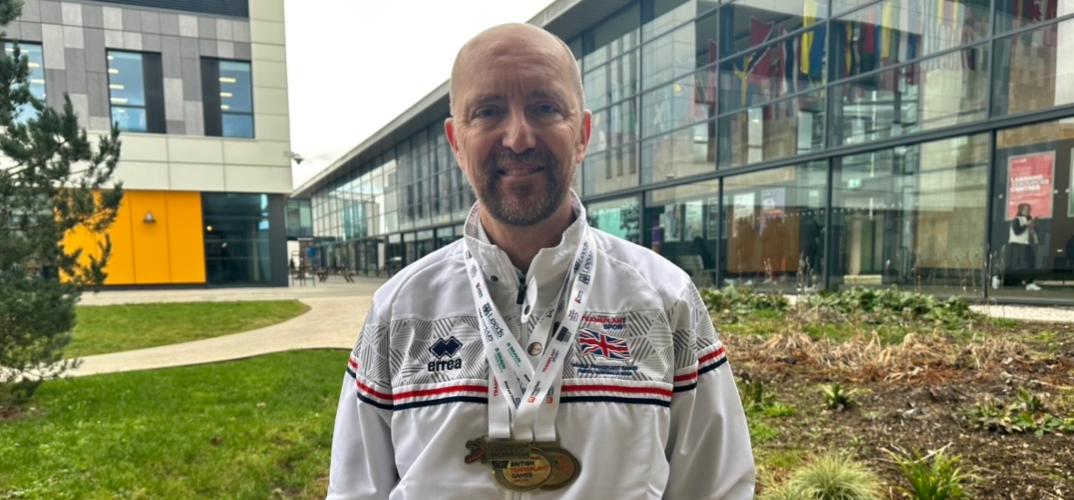University of Hertfordshire employee chosen to represent Great Britain in the World Transplant Games

A University of Hertfordshire staff member is one of 150 people to be selected to represent Great Britain at the upcoming World Transplant Games in Perth, Australia.
Andy Taylor, 57, of Watford, Hertfordshire - an advisor for the Academic Registry at the University, has been chosen to represent his country in badminton and table tennis at the international, multi-sport event that aims to both celebrate successful transplantation and raise awareness of the importance and benefits of organ donation.
Andy, who has always been a keen sportsman, specialising in all racket sports suffers from a hereditary condition called Polycystic Kidney Disease (PKD). An inherited disorder, it causes clusters of cysts to develop primarily within your kidneys, causing your kidneys to enlarge and lose function over time.
“My father had Polycystic Kidney Disease, so I grew up knowing there was a 50/50 chance I would also have it,” Andrew explains. “However, it wasn’t until 1999 I was 34, when I had to conduct an insurance-related medical check, that I was also diagnosed. I was fortunate to not suffer any major symptoms until I was 45, when my kidney condition got progressively worse, and I started to become very tired and cold all the time. I had to restrict my diet and was told in 2012 I would need a transplant within two years.”
Andy had a double nephrectomy in 2014 when both kidneys were removed. During the operation the hospital discovered that his liver also had Polycystic disease and as a result he would need both a kidney and liver transplant. This made it even trickier to find a suitable donor as both organs needed to come from the same person. Andy went on the waiting list for a donor, not knowing when he would get the call from the transplant co-ordinator to say a matched donor had been found. The average wait for a transplant is 2-3 years.
While waiting, Andy had to undergo dialysis three times a week, for five hours at a time, restrict his diet and his liquid intake to 500ml a day until a suitable donor could be found.
“I would work in the morning and then go to Watford Hospital for dialysis,” he continues. “It was exhausting and, while I was grateful, it was hard. Your life gets put on hold. I was also getting bigger and bigger as a result of cysts growing on my liver. I’m relatively small framed usually, but during dialysis I looked and felt like I was heavily pregnant. I was always cold and very tired, found breathing difficult, couldn’t pull my trousers up and couldn’t even tie my shoes!”
Eventually, in 2016, a suitable donor was found for Andy and he underwent his transplant. It was a major operation, and he ended up spending 10 weeks in hospital due to complications from the 12-hour surgery.
In the end, sport was the key to Andy’s recovery. He was aware of the World Transplant Games due to his father – an international athlete and kidney transplant recipient – competing in the British Transplant Games several times. Andy set his mind to becoming the next family member to reach the podium - and succeeded.
Andy competed in his first World Transplant Games tournament in 2019, winning gold in the men’s doubles badminton and silver in men's table tennis. He has since further competed in the British Transplant Games and the European Transplant Games in 2022, scooping up 3 medals in the process.
He’s now aiming to add a World Gold medal to his medal collection at this year’s World Transplant Games. To support this ambition, the University has offered to provide Andy with regular court and gym time, access to coaching, student practise partners and sports massages.
“I am honoured, humbled and excited to be selected to play for my country again in such an important tournament,” added Andy. “I am forever grateful to my donor and their family and to the skill, care and expertise of NHS staff. The main reason I want to participate, however, is to promote the benefits of organ donation. I want to raise awareness of just how important it is to discuss your organ donation wishes with loved ones - to ensure they know that if anything happens to you, they are aware that you wish to be an organ donor. That’s what my donor and their family did – and it transformed my life!”
There are currently over 6,000 people waiting for an organ transplant in the UK. To find out more about organ donation visit the NHS website.